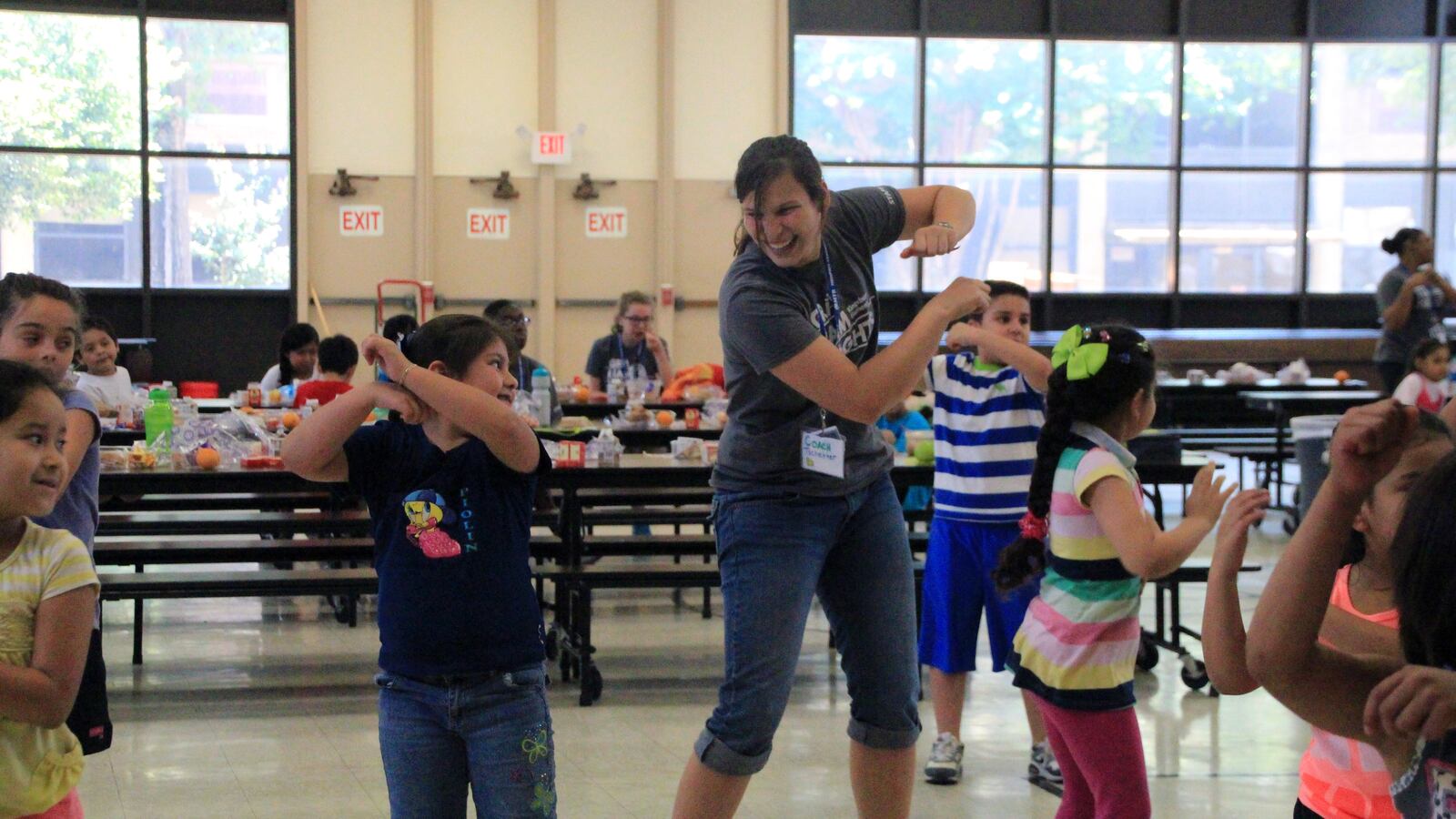As music blared in the lunchroom of Kingsbury Elementary School, Rose Logan grabbed a microphone and asked a hundred kids if they were ready to dance.
Logan may have sounded more like a camp counselor than a teacher as she led students in a dance party, but that’s part of the formula behind the Memphis Teacher Residency summer children’s camp. The goal is to get kids excited about learning — and to recruit potential educators like Logan to settle one day in Memphis as classroom teachers.
“We want to fight summer learning regression and build positive associations between our students and learning,” said Sarah Shaw, who leads curriculum for the camp. “But for the college kids, it’s also a first look at MTR for interested teachers and a place to get their feet wet.”
That early introduction is important as Memphis Teacher Residency seeks to expand its role in answering the question of how to ensure that every Memphis student has a high-quality teacher.
The question has long vexed education officials locally, especially in recent years with the push to improve Memphis’ long-struggling schools. Last year, the city’s top two academic leaders came together to ask business leaders, philanthropists and politicians to rebrand Memphis as “Teacher Town USA,” in an effort to market the city as a destination for young and energetic educators who are unwilling to accept low performance for poor students.
The Christian-based Memphis Teacher Residency, which launched in 2010, has been a fruitful pipeline for “Teacher Town” since before the effort had a name. Participants sign on to work in Memphis schools for four years and spend the first working with a mentor teacher and taking graduate classes taught by MTR staff and education professors at Union University in nearby Jackson.
Overall, about 200 teachers have gone through the residency program, and 70 more are joining this year. Most of the first crop have stayed in the classroom beyond their initial commitments and longer than teachers in the area typically remain in their schools — to great effect. A study commissioned by Shelby County Schools found that teachers trained through MTR receive higher scores on Tennessee’s evaluation system, which weighs student test score gains, than teachers trained elsewhere.
But even as the preparation was strong and the participants committed, MTR officials realized they could bring even more educators with strong potential to Memphis if they started earlier. So the program launched a summer camp three years ago to recruit college students from across the nation to experience urban education in Memphis, while also combating summer learning loss among Shelby County’s low-income students.

Candace Obadina, who directs MTRCamp, said the hope is that more college students will develop a passion for teaching in Memphis and will come back after graduating, moving more teaching talent into the city. So far, that appears to be happening, she said.
“Over the past two summers, 15 camp staff have stayed after college to join MTR,” Obadina said. “This has developed into an incredible opportunity for people who think they may be interested in urban ed to get their feet wet.”
The five-week summer camp rocketed from 75 students last summer to 250 this summer, and from one site to three in the Memphis neighborhoods of Binghampton, Orange Mound, and Mitchell Heights.
The camp tripled its summer staff this year to 58 college students, and more than 75 percent are from colleges outside of Memphis.
The proportion of residency participants who come from outside the area is on the rise: Of the 57 teachers in the 2014-15 class, 82 percent are from elsewhere in the country, up from 74 percent in the previous cohort, according to the MTR website.
And participants say the camp has played a crucial role in convincing them to enter the classroom for the long haul.
“I didn’t think or believe I could be a teacher until I first did camp two summers ago,” said Logan, who grew up in Springfield, Ill., graduated from Indiana University, and is now in her second year of teaching with MTR. “I grew up in neighborhoods similar to these kids, and I knew I wanted to give back. Camp showed me how, and gave me the confidence I needed.”
The children’s camp rotates kindergarten through second-grade students through various stations that emphasize math and literacy. Two college students work together in each classroom to lead activities including guided reading and crafts revolving around math skills.

For 6-year-old Cruz Chaidez, his favorite part of camp, besides dancing at lunchtime, is making triangles during math class.
“We get to make stuff like triangles and put them in order,” said Cruz, who goes to Kingsbury Elementary during the school year. “I like how we can get crazy here and have fun; it’s different than school.”
Convincing college graduates to move to a city known for its challenges in education and spend four years working in an urban classroom is not the easiest task. But a funny thing happens when you get to know the kids you’re teaching, Logan said.
“They steal your heart,” she said. “And so does the city. I see these college kids working here this summer, and so much of what they used to believe about these kids and neighborhoods has been shattered. We’re not coming to serve poor kids in the ‘hood; we’re coming to partner and work alongside a community that’s truly an awesome one.”
Konrad Mueller, who graduated in May with a degree in economics from University of Southern California, said it’s kids like Cruz who brought him back to MTR for a second summer.
“I came to Memphis for the barbecue but fell in love with the kids and their families,” Mueller said. “I know there are good people here and they need good teachers, and that’s what brought be back. I didn’t think much of Memphis when I moved here, but the culture here translates to a group of college kids who develop a heart for the city and stay around.”
Editor’s note: An updated number of how many college students have gone from camp to the residency program has been added.


